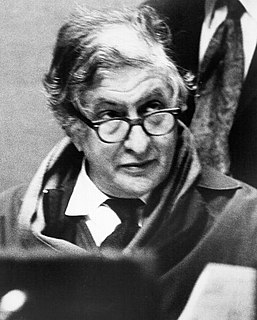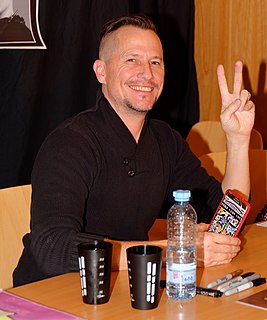A Quote by Louise Bourgeois
Everywhere in the modern world there is neglect, the need to be recognized, which is not satisfied. Art is a way of recognizing oneself, which is why it will always be modern.
Quote Topics
Related Quotes
It is often said that in today's modern and postmodern world that the forces of darkness are upon us. But I think not; in the Dark and the Deep there are truths that can always heal. It is not the forces of darkness but of shallowness that everywhere threaten the true, and the good, and the beautiful, and that ironically announce themselves as deep and profound. It is an exuberant and fearess shallowness that everywhere is the modern danger, the modern threat, and that everywhere nonetheless calls to us as savior.
Fantasy is more than an escape from the truths of the world and the past: it is an open acknowledgment that those truths are complex and morally difficult. It offers a different route to creating something which will resonate with readers, in a way which resists the erasure of privacy and autonomy which pervades our modern world.
Industrial Society is not merely one containing 'industry,' large-scale productive units capable of supplying man's material needs in a way which can eliminate poverty: it is also a society in which knowledge plays a part wholly different from that which it played in earlier social forms, and which indeed possesses a quite different type of knowledge. Modern science is inconceivable outside an industrial society: but modern industrial society is equally inconceivable without modern science. Roughly, science is the mode of cognition of industrial society, and industry is the ecology of science.
As a composer I might class myself as a Neo-Romantic, inasmuch as I have always regarded music as a highly personal and emotional form of expression. I like to write music which takes its inspiration from poetry, art and nature. I do not care for purely decorative music. Although I am in sympathy with modern idioms, I abhor music which attempts nothing more than the illustration of a stylistic fad. And in using modern techniques, I have tried at all times to subjugate them to a larger idea or a grander human feeling.
It is beyond a doubt that during the sixteenth century, and the years immediately preceding and following it, poisoning had been brought to a pitch of perfection which remains unknown to modern chemistry, but which is indisputably proved by history. Italy, the cradle of modern science, was at that time, the inventor and mistress of these secrets, many of which are lost.
But the thing that stands eternally in the way of really good writing is always one: the virtual impossibility of lifting to the imagination those things which lie under the direct scrutiny of the senses, close to the nose. It is this difficulty that sets a value upon all works of art and makes them a necessity. The senses witnessing what is immediately before them in detail see a finality which they cling to in despair, not knowing which way to turn. Thus this so-called natural or scientific array becomes fixed, the walking devil of modern life.







































